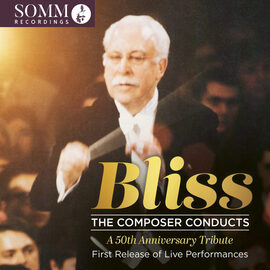Arthur Bliss (1891–1975) war ein anerkannt guter Dirigent seiner eigenen Musik, hat aber nur wenige kommerzielle Aufnahmen gemacht. Hier ist nun eine Hommage an den dirigierenden Komponisten mit BBC-Liveaufnahmen, veröffentlicht zum 50. Todestag von Bliss.
Das Programm beginnt mit der Colour Symphony. Ein Buch über Heraldik mit der Darstellung der symbolischen Bedeutungen der Grundfarben inspirierte ihn zur Komposition. Die Titel der vier Sätze lauten Violett (schwermütig), Rot (vital), Blau (mysteriös) und Grün (romantisch schwärmerisch).
Das Klavierkonzert von 1939 beginnt kraftvoll und heroisch schillernd. Das Adagietto ist neuromantisch und das Finale beginnt verhalten, maestoso, um dann zu einem brillanten und charakterlichen Schlussteil aufzurauschen.
Das 7 Minuten lange Stück The Phoenix ist laut Partiturangaben eine “Homage to France August 1944″, eine musikalische Beschreibung von “the imperishable
life and the transcendent beauty of France.” Bliss hat viel Frankreich in die sieben Minuten gepackt.
Bliss und sein jüngerer Bruder dienten im Ersten Weltkrieg, und Kennard wurde
in der Schlacht an der Somme getötet. 1930, geplagt von Albträumen über den Krieg und der Trauer um seinen Bruder, komponierte Bliss das fünfsätzige Werk Morning Heroes und widmete es « dem Gedenken an meinen Bruder Francis Kennard Bliss und alle anderen in der Schlacht gefallenen Kameraden ». Das Werk das musikalisch zwischen Trauer, Melancholie, Kampferinnerungen und Revolte wechselt, ist eine Symphonie für Redner, Chor und Orchester, mit Gedichten aus der der Ilias bis hin zu Walt Whitman und Wilfred Owen.
Das Concerto for Two Pianos ist in einer Fassung für zwei Klaviere und drei Hände, zu hören, die Bliss für Cyril Smith schrieb, nachdem ein Schlaganfall dessen linken Arm gelähmt hatte. Diese sehr vitale Aufführung mit Cyril
Smith, Phyllis Sellick und dem BBC-Symphonieorchester stammt von den Proms 1969.
Das Programm endet mit der Mêlée Fantasque. Der Komponist schrieb dazu: « In der Musik von Mêlée Fantasque habe ich versucht, den rhythmischen Schwung und die Bakst-ähnliche Farbigkeit vieler Gemälde von Lovat Fraser in meiner praktisch ersten Ballettmusik wiederzugeben. Zwischen den farbenfrohen Episoden finden sich elegische Passagen, die auf den Verlust dieses begabten Freundes hinweisen. »
Die Aufnahmen sind zwar bearbeitet worden und klingen recht transparent, aber auch etwas dumpf.
Arthur Bliss (1891–1975) was a renowned conductor of his own music. However, he made only a few commercial recordings. This tribute to the composer and conductor features live BBC recordings and was released on the 50th anniversary of Bliss’s death.
The program begins with the Color Symphony. He was inspired to compose it after seeing a book on heraldry depicting the symbolic meanings of the primary colors. The titles of the four movements are Violet (melancholic), Red (vital), Blue (mysterious), and Green (romantic and enthusiastic).
The 1939 piano concerto begins powerfully and heroically. The Adagietto is neo-Romantic, and the finale begins restrained and maestoso before rushing to a brilliant and characterful conclusion.
According to the score, the seven-minute piece The Phoenix is a « Homage to France, August 1944, » a musical depiction of « the imperishable
life and the transcendent beauty of France. » Bliss packed a lot of France into those seven minutes.
Bliss and his younger brother, Kennard, served in World War I. Kennard was killed in the Battle of the Somme. Plagued by nightmares about the war and grief over his brother’s death, Bliss composed the five-movement work Morning Heroes in 1930 and dedicated it « to the memory of my brother Francis Kennard Bliss and all other comrades who fell in battle. »
This symphony for speaker, choir, and orchestra alternates between grief, melancholy, memories of battle, and revolt. It features poems ranging from the Iliad to Walt Whitman’s Ode to the Fallen. It is a symphony for narrator, choir, and orchestra, with poems ranging from the Iliad to works by Walt Whitman and Wilfred Owen.
The Concerto for Two Pianos is heard in a version for two pianos and three hands, which Bliss wrote for Cyril Smith after a stroke paralyzed his left arm. This very lively performance with Cyril
Smith, Phyllis Sellick, and the BBC Symphony Orchestra is from the 1969 Proms.
The program ends with Mêlée Fantasque. The composer wrote, « In the music of Mêlée Fantasque I have tried to convey the rhythmic verve and Bakst-like colour of many of Lovat Fraser’s paintings, in what is virtually my first ballet score. Interspersed between colourful episodes are elegiac passages which hint at the loss of this gifted friend. »
The recordings have been edited and sound transparent yet somewhat muffled.





















